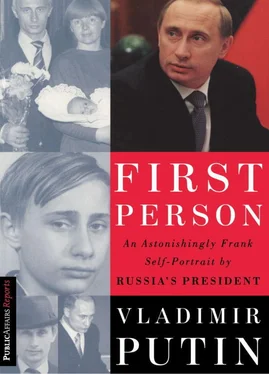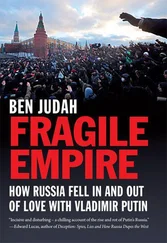Vladimir Putin - First Person
Здесь есть возможность читать онлайн «Vladimir Putin - First Person» весь текст электронной книги совершенно бесплатно (целиком полную версию без сокращений). В некоторых случаях можно слушать аудио, скачать через торрент в формате fb2 и присутствует краткое содержание. Город: New York, Год выпуска: 2000, ISBN: 2000, Издательство: PublicAffairs, Жанр: Биографии и Мемуары, Политика, Политика, Публицистика, на английском языке. Описание произведения, (предисловие) а так же отзывы посетителей доступны на портале библиотеки ЛибКат.
- Название:First Person
- Автор:
- Издательство:PublicAffairs
- Жанр:
- Год:2000
- Город:New York
- ISBN:978-0-786-72327-0
- Рейтинг книги:3 / 5. Голосов: 1
-
Избранное:Добавить в избранное
- Отзывы:
-
Ваша оценка:
- 60
- 1
- 2
- 3
- 4
- 5
First Person: краткое содержание, описание и аннотация
Предлагаем к чтению аннотацию, описание, краткое содержание или предисловие (зависит от того, что написал сам автор книги «First Person»). Если вы не нашли необходимую информацию о книге — напишите в комментариях, мы постараемся отыскать её.
First Person — читать онлайн бесплатно полную книгу (весь текст) целиком
Ниже представлен текст книги, разбитый по страницам. Система сохранения места последней прочитанной страницы, позволяет с удобством читать онлайн бесплатно книгу «First Person», без необходимости каждый раз заново искать на чём Вы остановились. Поставьте закладку, и сможете в любой момент перейти на страницу, на которой закончили чтение.
Интервал:
Закладка:
Do you call him?
Yes. He and I talk more now than we did before his retirement. Before, I wouldn’t have dreamed of calling him…. That is, I did pick up the phone and call him a few times, but only for work matters. Now our relationship is different. Now I can just call him and chat.
But do you visit him?
Yes, I visit him. Recently I went to his house on business. Boris Nikolayevich said to me, “Please stay for dinner. We’re going to have sushi.” Apparently he once tried sushi in a restaurant and he liked it. So his wife and daughter decided to put together a Japanese meal at home. Of course I stayed. Afterward we sat for a long time drinking beer and talking.
Does Yeltsin call you himself?
Yes, he has called several times. He was intersted to find out how things were going in the Caucasus. And then he once asked how our internal troops were doing. He called about the CIS summit, and we met at his initiative to discuss how to raise certain issues during the meeting with the CIS leaders. And we discussed the leadership of the Commonwealth. His experience in this regard is very helpful.
Everyone is wondering whether you are going to lock horns with Luzhkov [34] Yuri Luzhkov has been the mayor of Moscow since the Yeltsin era. Luzhkov was accused of embezzlement during his rebuilding of the Ring Road around Moscow.
like you did before?
Lock horns? But I never had any fight with him.
Alright, then. Will you try to break him, or will you work with him as with any other member of the Federation Council? [35] The upper chamber of Parliment, where the mayor of Moscow has a seat.
Of course I’ll work with him. I’m prepared to rely on him as someone with great influence in the largest region of the country—the capital—but his own actions must be directed at strengthening the state.
What were they directed at before?
Until now, to a large extent, they have been aimed at satisfying his political ambitions. When a regional leader is so ambitious, I think it is destructive for the country.
Actually, the fault lies not so much with the individual as with the central authority. As soon as the regional leaders sense that the government is strong and effective, they will return to the role prescribed for them by the Constitution, and begin to take care of business.
Like the Ring Road?
Yes, the Ring Road.
They say a lot of money was stolen on that project.
Whenever I hear someone accused of theft or something like that, I want to ask: Do we still presume people to be innocent? If a crime is not proven, no one can be accused of it.
Of course, there is also a peculiarly Russian feature that is known to all. Remember that joke from the Soviet era? Brezhnev comes to visit Carter. Carter says, “Do you see that beautiful bridge there?” “Yes,” says Brezhnev. Carter tells him: “It has five lanes running one way and five lines running in the opposite direction. But the plans called for 10 lanes one way and 10 lanes the other way.” “Well, where are the missing lanes?” asks Brezhnev. “They’re all here!” says Carter, and points to the furniture in the White House. Brezhnev thinks, “Well, alright!” Then Carter comes to visit him in Russia. Brezhnev says, “See the Moscow River?” “I see it,” says Carter. “Do you see the bridge across it?” “No, I don’t.” “Because it’s all right here!” says Brezhnev and he points to the furniture in the Kremlin.
Of course you can assume that somebody siphoned off funds from the construction of the Ring Road; but at least that road is out there, isn’t it? And you can be proud of it. And if somebody thinks that somebody stole something, let him go and prove it.
How do you think Luzhkov is going to treat you?
I think he will behave constructively. I don’t think he will really have a choice.
What are you implying?
Nothing. I’m not implying any forcible actions. You know, I think that many people believe that the president had ceased to be the center of power. Before, they behaved quite loyally. If need be, I will simply act in such a way as to guarantee that no one has such illusions anymore.
The most famous Petersburger is Anatoly Chubais. Do you have a close relationship with him? Weren’t you acquainted with him in Peter?
When I came to work for Sobchak, Chubais was the deputy chair of the Leningrad City Council executive committee. I never had any direct interaction with Chubais. I never dealt with him closely.
How did you react to his voucher plan?
I didn’t.
What did you do with your own voucher?
I lost it, at first, and then I found it and bought something with it, something stupid. About a year before the privatization, I spoke with Vasily Leontiev, the Nobel Prize winner, and he told me, “Give the property away to whomever you wish. In two or three years it will end up in the right hands anyway. Give it away free if you have to.” And Chubais did give it away. I think that was his exact approach—although, of course, you should ask him about it yourself.
Two or three years? Do you think that’s inevitable?
I don’t know whether it’s inevitable. What’s important is that the property be in the hands of an effective owner.
But it wound up in the hands of a different owner.
That’s just it.
Weren’t you offended when Chubais came to work in the presidential administration, and the first thing he did was eliminate the position that had been promised to you?
No, I wasn’t offended. I know his technocratic approach to the solution of problems. He had decided that the existing staff structure did not correspond to the challenges that faced the administration.
There was nothing personal about it?
There is no question of intrigue here. He is not the sort of person who is guided by sentiments. Of course I can’t say that I was overjoyed at the time, but I didn’t feel angry at him. Quite frankly, I wasn’t particularly hurt.
So when did you establish more or less regular contact with Chubais?
Never.
But he comes and visits you at your dacha on occasion?
Yes, he sometimes comes to visit.
Were you surprised that Chubais supported the operation in Chechnya?
Yes.
Why?
I thought that he lived in a world of illusions. But it turned out that he’s more of a pragmatist, that he’s capable of grasping the realities of life and is not guided by ephemeral ideas.
And when he said that he supported your candidacy in the presidential elections?
That didn’t surprise me either, because he knows perfectly well that I am not a dictator and don’t intend to return the country to an administrative economy ruled by directives.
Chubais, by the way, is a very good administrator. I’ve watched him run the Commission on Operations, and I’ve seen him in action at government meetings. He is able to grasp the main point, and as Vladimir Ilyich Lenin used to say, pull out the whole chain. But of course, he is so hard-nosed, like a Bolshevik… yes, that’s the right word to describe him. Unfortunately, he has a bad credit record. I mean his public credit—the public’s trust in him—is low.
What political leaders do you find most interesting?
Napoleon Bonaparte. [Laughs.]
No, seriously.
De Gaulle, most likely. And I also like Erhard. He was a very pragmatic person. He was the one who built the new Germany after the war. In fact, his entire conception for the reconstruction of the country began with the creation of new moral values for society. For Germany, this was particularly important, after the collapse of Nazi ideology.
Читать дальшеИнтервал:
Закладка:
Похожие книги на «First Person»
Представляем Вашему вниманию похожие книги на «First Person» списком для выбора. Мы отобрали схожую по названию и смыслу литературу в надежде предоставить читателям больше вариантов отыскать новые, интересные, ещё непрочитанные произведения.
Обсуждение, отзывы о книге «First Person» и просто собственные мнения читателей. Оставьте ваши комментарии, напишите, что Вы думаете о произведении, его смысле или главных героях. Укажите что конкретно понравилось, а что нет, и почему Вы так считаете.












